This pub is named after a member of the Nairn family, helping to put Kirkcaldy on the map. In 1847, Michael Nairn started a floor-covering factory. He was so successful that others set up similar businesses, and Kirkcaldy became renowned as the ‘linoleum centre of the world’. One of the Nairn’s many gifts to the town included the land (donated by Robert Nairn) to build the Trustees Savings Bank (TSB) – now this Wetherspoon pub.
Prints and text about The Robert Nairn.
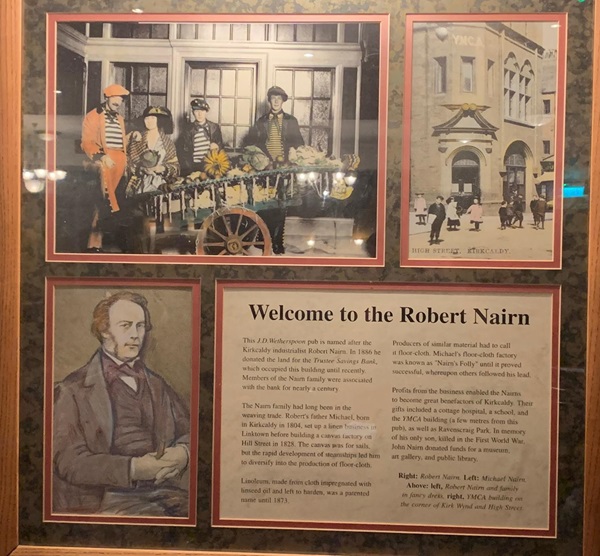
The text reads: This JD Wetherspoon pub is named after the Kirkcaldy industrialist Robert Nairn. In 1886 he donated the land for the Trustee Savings Bank, which occupied this building until recently. Members of the Nairn family were associated with the bank for nearly a century.
The Nairn family had long been in the weaving trade. Robert’s father Michael, born in Kirkcaldy in 1804, set up a linen business in Linktown before the building a canvas factory on Hill Street in 1828. The canvas was for sails, but the rapid development of steamships led him to diversify into the production of floor-cloth.
Linoleum, made from cloth impregnated with linseed oil and left to harden, was a patented name until 1873.
Producers of similar material had to call it floor-cloth. Michael’s floor-cloth factory was known as Nairn’s Folly until it proved successful, whereupon others followed his lead.
Profits from the business enabled the Nairn’s to become great benefactors of Kirkcaldy. Their gifts included a cottage hospital, a school, and the YMCA building (a few metres from this pub), as well as Ravenscraig Park. In memory of his only son, killed in the First World War, John Nairn donated funds for a museum, art gallery, and public library.
Right: Robert Nairn
Left: Michael Nairn
Above: left, Robert Nairn and family in fancy dress, right, YMCA building on the corner of Kirk Wynd and High Street
Prints and text about Adam Smith.
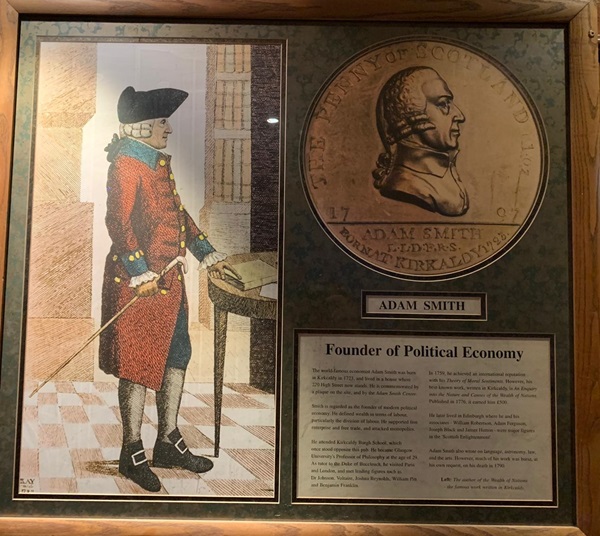
The text reads: The world-famous economist Adam Smith was born in Kirkcaldy in 1723, and lived in a house where 220 High Street now stands. He is commemorated by a plaque on the site, and by the Adam Smith Centre.
Smith is regarded as the founder of modern political economy. He defined wealth in terms of labour, particularly the division of labour. He supported free enterprise and free trade, and attacked monopolies.
He attended Kirkcaldy Burgh School, which once stood opposite this pub. He became Glasgow University’s Professor of Philosophy at the age of 29. As tutor to the Duke of Buccleuch, he visited Paris and London, and met leading figures such as Dr Johnson, Voltaire, Joshua Reynolds, William Pin and Benjamin Franklin.
In 1759, he achieved an international reputation with his Theory of Moral Sentiments. However, his best-known work, written in Kirkcaldy, is An Enquiry into the Nature and Causes of the Wealth of Nations. Published in 1776, it earned him £500.
He later lived in Edinburgh where he and his associates – William Robertson, Adam Ferguson, Joseph Black and James Hutton – were major figures in the ‘Scottish Enlightenment’.
Adam Smith also wrote on language, astronomy, law, and the arts. However, much of his work was burnt, at his own request, on his death in 1790.
Left: The another of the Wealth of Nations – the famous work written in Kirkcaldy
Prints and text about Kirkcaldy’s literary connections.
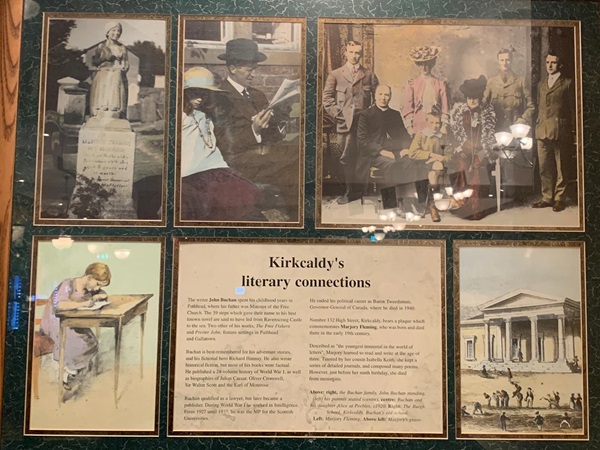
The text reads: The writer John Buchan spent his childhood years in Pathhead, where his father was Minister of the Free Church. The 39 steps which gave their name to his best known novel are said to have led from Ravenscraig Castle to the sea. Two other of his works, The Free Fishers and Prester John, feature settings in Pathhead and Gallatown.
Buchan is best remembered for his adventure stories, and his fictional hero Richard Hannay. He also wrote historical fiction, but most of his books were factual. He published a 24 volume history of World War I, as well as biographies of Julius Caesar, Oliver Cromwell, Sir Walter Scott and the Earl of Montrose.
Buchan qualified as a lawyer, but later became a publisher. During World War I he worked in Intelligence. From 1927 until 1935, he was the MP for the Scottish Universities.
He ended his political career as Baron Tweedsmuir, Governor-General of Canada, where he died in 1940.
Number 132 High Street, Kirkcaldy, bears a plaque which commemorates Marjory Fleming, who was born and died there in the early 19th century.
Described as “the youngest immortal in the world of letters”, Marjory learned to read and write at the age of three. Tutored by her cousin Isabella Keith, she kept a series of detailed journals, and composed many poems. However, just before her ninth birthday, she died from meningitis.
Above: right, the Buchan family, John Buchan standing, (left) his parents seated (centre)
Centre: Buchan and his daughter Alice at Peebles, c1920
Right: The Burgh School, Kirkcaldy, Buchan’s old school
Left: Marjory Fleming
Above left: Marjory’s grave.
A photograph of High Street, Kirkcaldy, c1928.
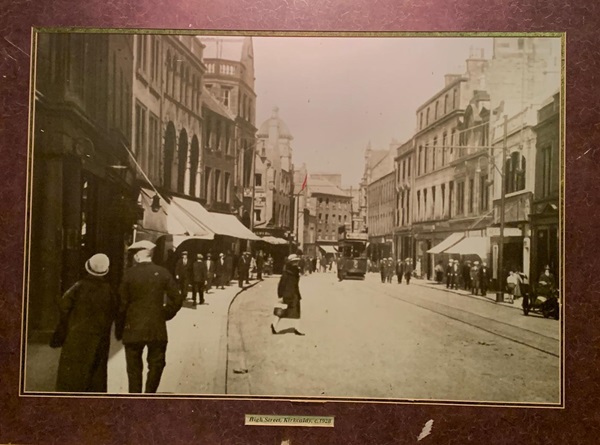
A photograph of St. Brycedale Avenue, Kirkcaldy, c1910.
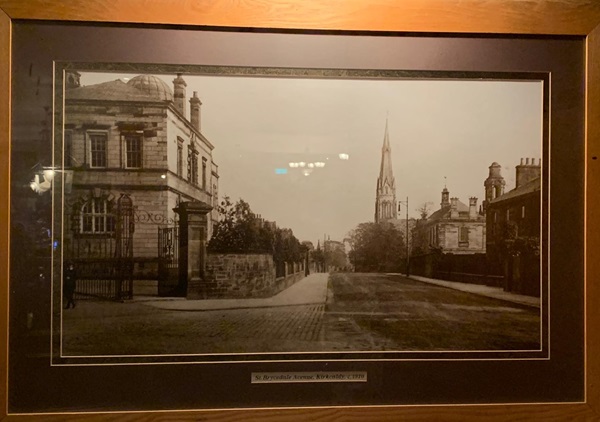
A photograph of High Street, Kirkcaldy, c1948.
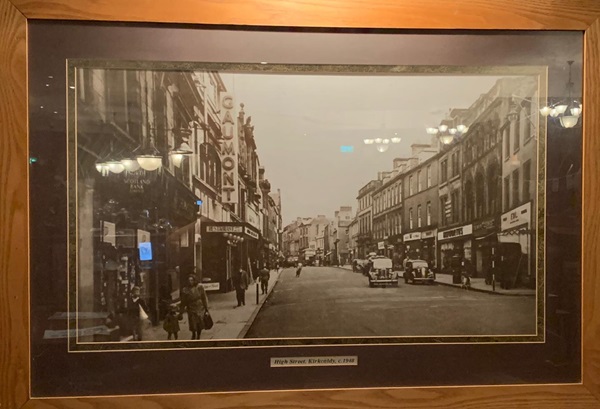
If you have information on the history of this pub, then we’d like you to share it with us. Please e-mail all information to: pubhistories@jdwetherspoon.co.uk